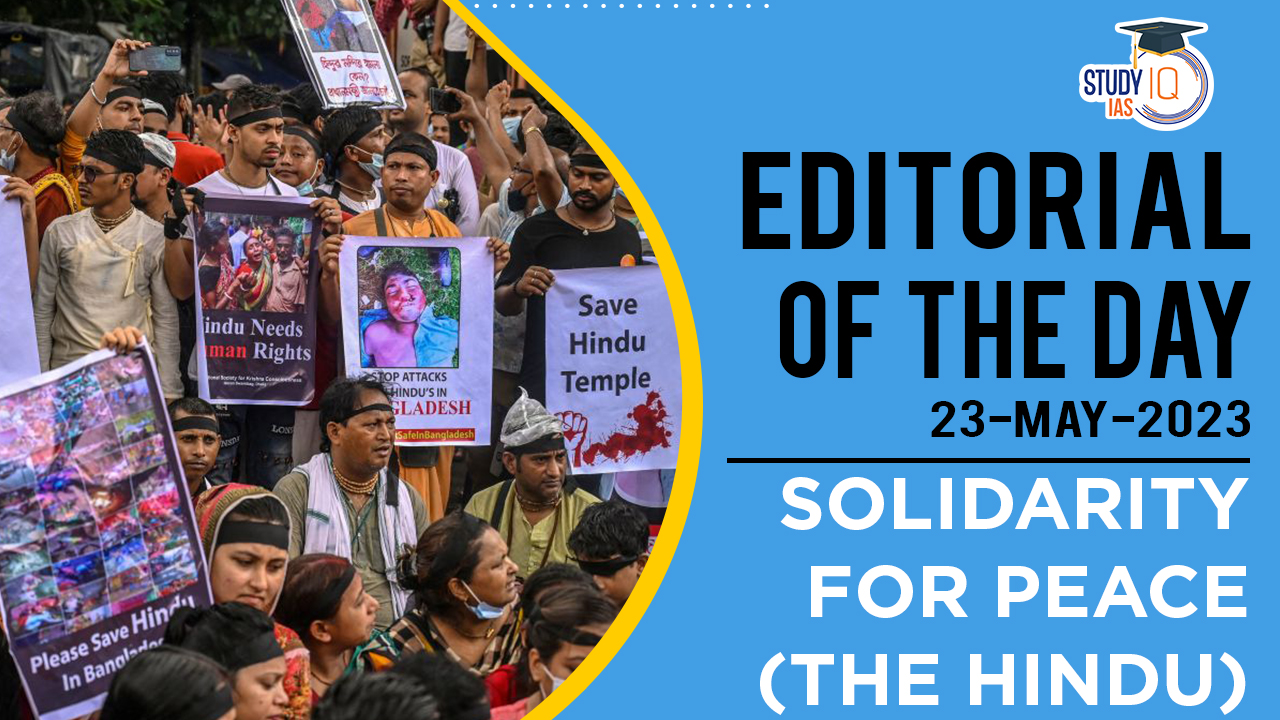Table of Contents
Context: The article is discussing the G-7 summit that took place in Hiroshima, Japan. It highlights that the Japanese Prime Minister, Fumio Kishida, who is from Hiroshima, intended to convey a message of global solidarity for peace by hosting the summit in the city.
Solidarity for Peace Background
What is Group of Seven (G7)?
- It is an intergovernmental organisation that was formed in 1975.
- The bloc meets annually to discuss issues of common interest like global economic governance, international security and energy policy.
- The G7 countries include the UK, Canada, France, Germany, Italy, Japan and the US.
- The G7 does not have a formal charter or a secretariat. The presidency, which rotates among member countries each year, is in charge of setting the agenda. Sherpas, ministers and envoys hammer out policy initiatives before the summit.
- As of 2022, G7 countries make up 10% of the world’s population, 31% of global GDP, and 21% of global carbon dioxide emissions.
- China and India, the two most populous countries with among the largest GDP figures in the world, are not part of the grouping.
- In all G7 countries, annual public sector expenditure exceeded revenue in 2021. Most G7 countries also had a high level of gross debt, especially Japan (263% of GDP), Italy (151%) and the US (133%).
- The G7 countries are important players in global trade. The US and Germany in particular are major export nations. Both sold goods worth well over a trillion US dollars abroad in 2021.
- All the G7 countries and India are a part of G20.
Decoding the Editorial
The article is discussing the G-7 summit that took place in Hiroshima, Japan.
- The G-7, consisting of the world’s most industrialized nations along with the EU leadership, issued a special statement on nuclear disarmament called the “Hiroshima Vision Statement on Nuclear Disarmament.”
- The presence of US President Joe Biden, only the second sitting American President to visit Hiroshima, emphasized the significance of the summit.
- The surprise arrival of Ukrainian President Volodymyr Zelenskyy added to the message of the summit, drawing attention to Russia’s invasion of Ukraine.
- The Indian Prime Minister’s statement describing the crisis as a matter of “humanity” was also noteworthy.
- While the G-7 members issued a separate statement on Ukraine and imposed additional sanctions on Russia, the author feels that they failed to outline a clear path towards dialogue and ending the war.
Views of the Author:
- The G-7, despite its economic significance and representation of wealth, is highly unrepresentative of the current world and lacks diversity.
- While the G-7 countries collectively possess more than half of the world’s net wealth, they account for less than one-third of global GDP and only a fraction of the world’s population.
- The author points out that the G-7 predominantly reflects a Euro-American worldview, with limited discussion on expanding its membership to include other major economies.
- The expulsion of Russia from the G-7 further narrowed its representation, and the exclusion of countries like China and India, which have significant economic influence and population, raises questions about the legitimacy and relevance of the grouping.
- It is suggested that the G-7 should recognize its limited scope and consider including larger economies and major global energy providers.
- Although the G-7 summit in Hiroshima touched upon certain issues such as transparent financing, debt sustainability in developing nations, and addressing climate change, the article criticizes the lack of concrete measures proposed to fulfill these responsibilities.
- It expresses hope that the upcoming G-20 summit in Delhi will adopt a more inclusive approach and contribute to building a comprehensive global consensus on major challenges faced by the world.
Overall, there is a need for the G-7 to expand its perspectives, address its limitations, and actively engage with a broader range of countries and viewpoints to effectively tackle global issues.
Reasons for choosing Hiroshima:
Hiroshima was chosen as the venue for the G7 summit due to several reasons:
- Symbolism: Hiroshima holds immense symbolism as the first city in the world to experience the devastating effects of a nuclear weapon. By hosting the summit in Hiroshima, the Japanese Prime Minister, Fumio Kishida, aimed to highlight the importance of nuclear disarmament and nonproliferation, emphasizing the need for global peace and security.
- Prime Minister’s Commitment: Choosing Hiroshima as the venue of the G7 summit reflects the PM’s personal commitment and determination to put these issues at the forefront of the international agenda.
- Focus on Nuclear Testing and Accidents: In addition to the G7 leaders, Prime Minister Kishida extended invitations to leaders from countries that have been affected by nuclear testing or accidents, such as Kazakhstan, Marshall Islands, Ukraine, and Belarus. This further emphasizes the significance of addressing the consequences of nuclear weapons and working towards a world free of nuclear threats.
- Resilience and Peaceful Transformation: Hiroshima’s transformation from a city devastated by the atomic bombing to a vibrant and prosperous regional hub showcases its resilience and commitment to peace. The city’s dedication to promoting nuclear disarmament and its numerous monuments and museums commemorating the victims of the atomic bombing make it a fitting location for discussing global challenges and fostering international cooperation.
Beyond the Editorial
Significance of G7 for India:
The G7 holds significance for India on several fronts:
- Economic Importance: The G7 countries, comprising major advanced economies like the United States, Japan, Germany, the United Kingdom, France, Italy, and Canada, represent a significant portion of global GDP and trade. As India aims to strengthen its economic ties and attract investments, engaging with G7 nations provides opportunities for trade, investment, and technology cooperation.
- Strategic Partnerships: G7 countries are key strategic partners for India in various areas, including defense, security, counterterrorism, and intelligence sharing. Collaborative efforts with G7 nations help enhance India’s national security and address common security challenges.
- Climate Change and Sustainable Development: The G7 plays a crucial role in shaping global policies on climate change, sustainable development, and environmental issues. As India is committed to sustainable growth and addressing climate change, participating in G7 discussions allows India to contribute its perspectives, showcase its initiatives, and seek support for clean energy transition and climate finance.
- Technology and Innovation: G7 countries are leaders in technology and innovation. Engaging with these nations offers India opportunities for technological collaboration, research and development partnerships, and leveraging advanced technologies for its domestic growth and development plans.
- Global Diplomacy and Influence: Being invited to G7 summits provides India a platform to engage with world leaders and shape global agendas. It allows India to project itself as an emerging power, contribute to discussions on various global challenges, and strengthen its diplomatic relations with G7 countries and other participants.
- Multilateral Cooperation: The G7 serves as an important forum for discussing and coordinating positions on various global issues, such as global trade, public health, terrorism, and human rights. Participation in G7 summits enables India to advocate for its interests, contribute to global governance, and collaborate on addressing global challenges.


 SSC CGL Exam 2025 Apply Online Starts Ap...
SSC CGL Exam 2025 Apply Online Starts Ap...
 Daily Quiz 19 April 2025
Daily Quiz 19 April 2025
 Vehicle-to-Grid (V2G) Technology and its...
Vehicle-to-Grid (V2G) Technology and its...





















